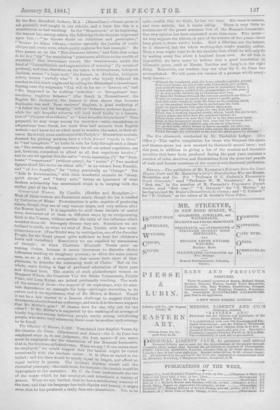Time Odyssey of Homer, Translated into English Verse, by
Sir Charles du. Cane. (Blackwood and Sons.)—Sir C. du Cane loss employed what is, in our judgment, the best metro—if one metro must be employed—for the translation of the Homeric hexameter, that is, the fourteen-sylla.bled verso. When we say " if one metre must be employed," we would suggest that tlso iambic might be varied occasionally with the trochaic, metre. It is often so varied in the ballad ; and the lines would be nearly equal in length, and afford an equal variety in pauses. The trochaic rhythm would suit the rhetorical passages,—the ninth book, for instance ; the iambic would be appropriate to the narrative. Sir C. On Cane understands the use of the metre which lie has employed, and introduces a variety of pauses. When we say, further, that lie has a satisfactory mastery of the text, and that his language has both dignity and beauty, it might seem that he has produced n really first-rate translation. Yet, to be quite candid, this, we think, he has not done. His verse is oorreet,
and even artistic, but it wants swing. There is very little to remind one of the grand sonorous flow of the Homeric hexameter. Our own opinion has been expressed more than once. Five years— we may suppose the leisure, or part of the leisure, of five years—have been given to these twelve books. Half a lifetime, not the leisure, be it observed, but the whole working-day, might possibly suffice. Then a man might hope to do his absolute best, which ho will only do by making every line about a hundred times over. As all this is impossible, we have come to believe that a good translation in idiomatic prose, such as Messrs. Butcher and Lang's, is the right thing. Meanwhile, our readers may see what Sir C. du Cane has accomplished. We will quote his version of a passage which every- body knows:— "Without the courtyard, nigh the door, extends a garden ground,
Four nem broad, on either side with fence-work girt around, And orchard trees of lofty height grew in luxuriance there,
Laden with apples, golden fruit, pomegranate, or with pear, Or in rich plenty lueelone fig or blooming olive bear. Of those the fruitage through the your nor perisheth nor fails,—
Winter or slimmer, evermore blow zephyr's gentle gales, And with their breath to early life force on the budding shoot. Or on the pendent branches fan to mellowness the fruit.
Apple on apple ripens fast, pear follows upon pear,
Fig upon fig, and grape on grape the vine doth daily bear, There, too, a teeming vineyard stands, where, 'Heath the sun to dr:f. Upon a warm and level floor the gathered clusters lie.
Others from vines e'en now they Dull, or in the trine-press tread. ; some in the foreground purple fast, come but the blossom shod;
And at the vineyard's furthest end, sot out in trim array, Are garden beds, whore flower to fleemr succeeds, for ever gay,
Two fountains—ono with crystal rifle, adown the garden gleams, Whilst through the courtyard to the hall the other pours its streams."


































 Previous page
Previous page